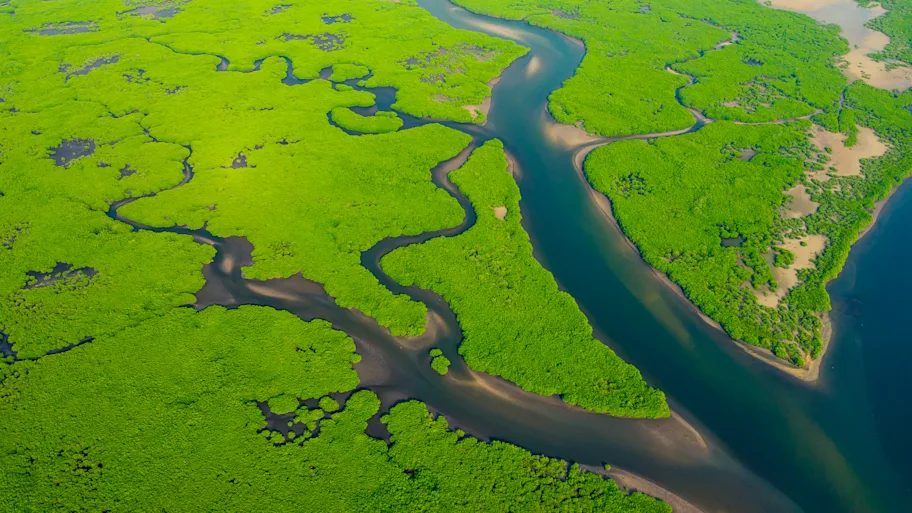
- Science News
- Open science policy
- How to accelerate breakthrough scientific solutions to urgent planetary crises
How to accelerate breakthrough scientific solutions to urgent planetary crises

By Kamila Markram, Frontiers CEO and co-founder
In January 2025, I travelled to Davos to participate in the World Economic Forum (WEF) annual meeting as a result of the newly established partnership between Frontiers and the WEF. My message was simple: making science openly available to the world will accelerate solutions to the transition to zero carbon, clean economies, and fuel the innovation cycle at unprecedented speed.
The urgent timeline
We need to reduce carbon emissions by 45% within five years and transition to a zero-carbon economy by 2050. This requires reinventing, restructuring, and rebuilding our cities, energy systems, transportation systems, food supply chains, and industries. The scale of this challenge is immense, and the short timeline makes it the biggest challenge humanity has ever faced. We must accelerate our efforts.
Collaboration across sectors
Solving this challenge requires cooperation between governments, companies, and scientists. Governments must set the vision, roadmap, and incentives towards zero-carbon economies. Businesses must scale new solutions and technologies. Ultimately, it is up to scientists to deliver solutions and provide the scope and understanding of earth systems, planetary boundaries, and critical tipping points.
Advancements in physics, chemistry, and material science have provided solutions for the energy transition, and we are making progress. We are transitioning our transportation system to electric cars.
However, there are still many solutions needed, including smaller batteries and better storage, carbon-neutral steel and cement or new equivalent materials, clean fuels for planes, sustainable fertilizers, pesticides, and high-yield crop production to feed a growing population without harming planetary health.
All this requires massive acceleration in science. Accelerating scientific solutions requires:
more funding
open access to research articles and data
faster scientific consensus on effective solutions
On the funding front, there's encouraging news: the global scientific community is more robust than ever, with nearly 10 million researchers leading research and development efforts supported by R&D budgets totalling approximately US$2.5 trillion. While political and economic shifts can influence short-term priorities, the long-term trend of increasing investment in science and sustainability remains strong across administrations and global markets.
This surge in investment is driving significant innovation, evident in the growing number of research publications—currently around four million peer-reviewed articles per year, increasing at a rate of 4% annually.
This wealth of research is increasingly being converted into practical applications, as seen in the rising number of patents, now numbering two million annually and expanding at an unprecedented rate of 10% per year.
The number of climate change and sustainability research papers is approaching 100,000 articles per year, doubling over a seven-year span. Additionally, there are one million papers published annually in material science, chemistry, physics, and environmental sciences—all critical for transitioning to zero-carbon economies.
We need open access to science
Despite a robust scientific workforce and increasing funds, we are not yet operating at full capacity. Scientists, companies, and governments have limited access to scientific output and articles, and there is no strong consensus on the most effective solutions. Limiting access to scientific articles and data slows the innovation cycle, delaying decisive action and time to market.
A decade ago, nearly all scientific articles were locked behind journal subscription paywalls, severely restricting access. As a neuroscientist researching autism, I experienced this barrier firsthand during my PhD studies at the Swiss Federal Institute of Technology in Lausanne.
When I attempted to download my own published work to share with colleagues, friends, and family, I was shocked to discover that our institution, despite being one of the wealthiest universities globally, did not subscribe to the life science journal in which it was published. I ended up paying for access to my paper out of my own pocket.
This experience raised a profound question for me: if I couldn't access my own research at such a well-funded institution, how could other researchers at less affluent universities do so? Moreover, how could parents, patients, and doctors stay informed about the latest advancements in autism research?
Seventeen years ago, inspired by these challenges, I co-founded Frontiers with my husband and fellow neuroscientist, Henry Markram.
Frontiers is a community-driven publishing platform with a mission to make all of science openly accessible. By removing barriers to access, we aim to enhance collaboration among scientists, accelerating the delivery of solutions for healthy lives on a healthy planet.
The impact of the open access movement
Frontiers and other open access publishers have shown that open access is financially sustainable and can improve the quality of peer-reviewed articles.
Although today about half of the four million science articles published per year are openly accessible, the other half, especially in climate and earth science, remains behind prohibitive paywalls. How can we solve the climate crisis and move to clean economies if we cannot access essential science and solutions?
The COVID-19 pandemic recently and powerfully demonstrated how swiftly we can tackle a global crisis with open and unrestricted access to science.
As the pandemic unfolded, everyone relied on scientists to develop vaccines and treatments. It quickly became evident that delivering fast solutions required completely unrestricted access to all coronavirus-related research.
In an unprecedented and often overlooked move, policymakers issued a call to action and created a database to make all coronavirus research articles openly accessible worldwide, fostering better collaboration among scientists and innovators to deliver faster solutions. The coronavirus genetic sequence was also shared openly, which immediately triggered a global race to develop a vaccine.
This openness in sharing genetic data and articles—with both people and machines—led to the fastest vaccine and treatment development in human history, saving millions of lives and trillions of dollars in medical costs and economic losses.
However, what was achieved for COVID-19 is not yet the case for climate and Earth research, material science, chemistry, physics, and biology—sciences crucial for understanding planetary boundaries and developing solutions for clean energy, industries, cities, and economies. With looming deadlines, we have absolutely no time to waste.
Launching the Open Science Charter
To win the climate race, it is imperative for governments worldwide to unleash their science by mandating full open access to all tax-funded scientific articles and data. That's why we launched the Open Science Charter in 2023 at the COP meeting in Dubai.
This open letter calls for exactly that: government-mandated open science across the globe. It has already been signed by thousands of leading scientists, NGOs, and policymakers.
Our goal is to bring the Open Science Charter to the next COP 30 meeting in Brazil and make it part of the official negotiations to achieve a coordinated global mandate that requires all publicly funded research—data and publications—to be openly available.
This would immediately accelerate the speed of innovation towards zero-carbon economies and help prevent the worst outcomes of climate change and the crossing of irreversible planetary tipping points.
Making science open is a simple solution that actually saves public funds and is absolutely fundamental to combating climate change within our critical timeline. However, the impact of open access to science will extend beyond solving climate change.
It will tremendously benefit companies, which currently face very limited access to science. While large corporations can afford more access, smaller ones often remain in the dark, creating an uneven playing field. Making all science open will benefit every company by accelerating their innovation capacity, providing fairer competition, and boosting economic output.
We need consensus on the best solutions
To tackle planetary challenges like climate change, it's crucial to expedite scientific consensus on breakthrough solutions. The quicker the scientific community agrees that a particular breakthrough is well supported by evidence and ready for real-world implementation, the faster governments gain confidence to legislate, industries feel secure to invest, and societies rally behind clear solutions.
Historically, reaching consensus has been a slow and inefficient process, taking 10 to 30 years from discovery to widespread agreement and action. Nonetheless, history shows that action follows consensus: for instance, it took the scientific community 10 years to agree that CFCs deplete the ozone layer.
However, once this link was established, the Montreal Protocol was signed within two years (in 1987), leading to a global ban on CFCs. Similarly, after reaching consensus on the critical 1.5°C warming threshold in the 2014 AR5 IPCC report, the Paris Agreement mobilized global climate action.
We must do everything possible to reduce the time it takes to systematically reach consensus. To shorten this timeline, we launched the Frontiers Planet Prize in 2022, aiming to reduce the consensus period from decades to one-two years. The prize's rigorous selection process involves:
Grassroots selection: Universities nominate impactful peer-reviewed sustainability studies.
National stage: National academies choose top national nominees based on scientific merit and societal impact.
Global stage: A 'Jury of 100' experts, led by Prof Johan Rockström, selects three international champions, awarding US$1 million each to amplify their work.
Success stories include Japanese researchers developing rice that grows in polluted environments, Danish proposals for using volcanic rock to reduce atmospheric carbon, Chinese methods to cut fertilizer emissions, and Turkish advancements in carbon-absorbing concrete.
This initiative ensures the swift transition of validated solutions from labs to policymakers, industries, and society. With this systematic approach, the Frontiers Planet Prize aims to collapse the consensus timeline to just one-two years, which is critical given the urgency of planetary crises like climate change and biodiversity loss.
Conclusion: transforming challenges into opportunities
Transitioning to zero-carbon economies is not just a critical challenge; it is also a tremendous opportunity to create sustainable economies that produce wealth and health for generations to come.
To achieve this within the necessary short timeline and prevent the worst outcomes of planetary tipping points that threaten our safety and economic prosperity, we need to accelerate scientific breakthroughs and innovation.
This can be done by improving the mechanisms for reaching consensus on the best breakthrough solutions and providing open access to scientific articles and data for both people and machines. This cost-effective and simple accelerator benefits all players in the innovation cycle. What worked for the biggest public health challenge will undoubtedly also work for the biggest planetary health challenge of our time.






